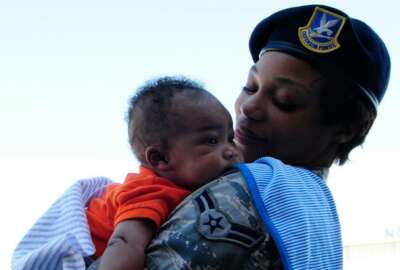

Lower priority families will have to give up their child care spots if active duty families can't find accommodations in 45 days.
The Defense Department is expanding its limited childcare spots for activated members of the military; however, the move may displace DoD civilians and members of the Coast Guard with children enrolled in child development centers.
Starting June 1, DoD child development centers will prioritize active duty military families over civilian department employees and other parts of the total military force.
“This policy prioritizes families with parents who are active duty or have spouses seeking employment,” Nicole Russell, government relations deputy director for the National Military Family Association, told Federal News Network.
The memo, signed in February, also allows DoD to remove family with lower priority from childcare to make room for an active duty family if they have been waiting for 45 days or longer for a spot.
Top priority categories include single or dual active duty service members and active duty members with full-time working spouses. In this case, active duty also refers to reserve and National Guard members who are on duty or training status. Subsections below that include active duty service members with part-time working spouses and active duty service members with spouses in post-secondary education.
Single or dual DoD civilian employees will move to the second priority tier.
Active duty members of the Coast Guard, DoD civilians with a spouse in school or seeking employment or active duty service members with a non-working spouse will all drop to the third priority tier known as “space available patrons.”
“When all priority 1 and 2 patrons have been placed into care, childcare centers may place additional eligible patrons not identified in priority 1 and 2 into space available care,” the memo states. “Space available patrons will be supplanted by an eligible priority 1 or a priority 2 patron when the anticipated placement time of the priority 1 or a priority 2 patron exceeds 45 days beyond their date care needed.”
Space available categories are ranked as follows:
Russell said members of the Coast Guard reached out to her with concerns about the new policy. The Coast Guard runs some of its own child care centers, but they are not as ubiquitous as DoD centers. There are currently no numbers on how many Coast Guard members will be impacted.
”We acknowledge this policy change presents a challenge for some families. The department is committed to ensuring our military members have the care they need to be mission ready,” Kim Joiner, acting deputy secretary of defense for military community and family policy, said in a March 9 statement.
DoD is struggling to keep up with the demand for child care, which is why the memo was signed, Russell said.
According to the 2019 Blue Star Families Military Family Lifestyle Survey, 50% of service members reported it was difficult to find a childcare provider they could afford.
”The department’s system of child care was established to assist service members as they face the unique challenges associated with the demands of military service,” Virginia Penrod, acting assistant secretary of defense for manpower and reserve affairs, said. ”Over time, child care access expanded to serve the total force, but we must not lose sight of the service member and mission requirements. We must ensure that our military members and families have the support needed in order to be mission ready.”
Copyright © 2024 Federal News Network. All rights reserved. This website is not intended for users located within the European Economic Area.
Scott Maucione is a defense reporter for Federal News Network and reports on human capital, workforce and the Defense Department at-large.
Follow @smaucioneWFED

